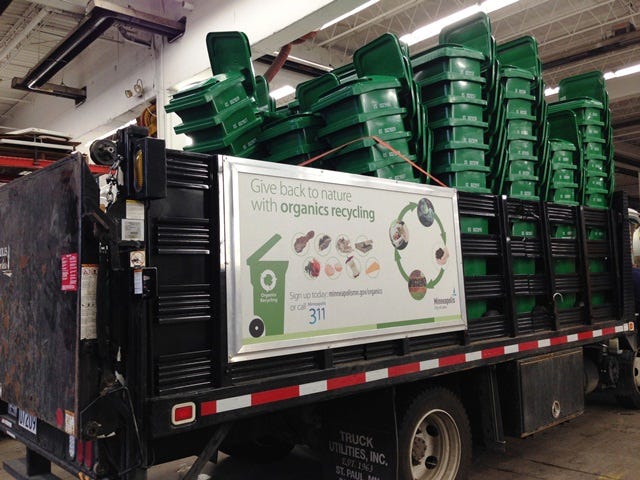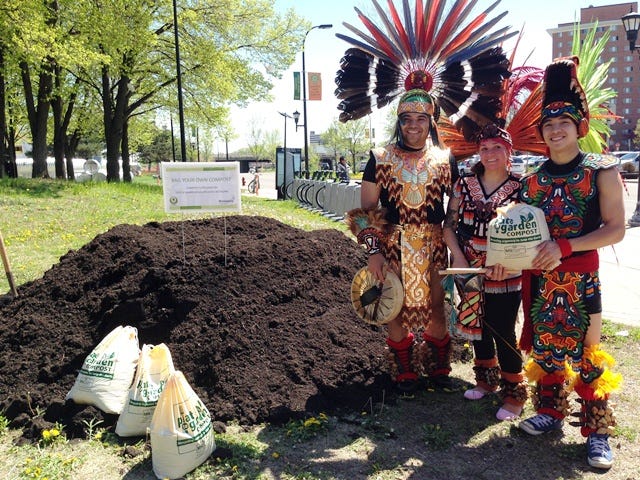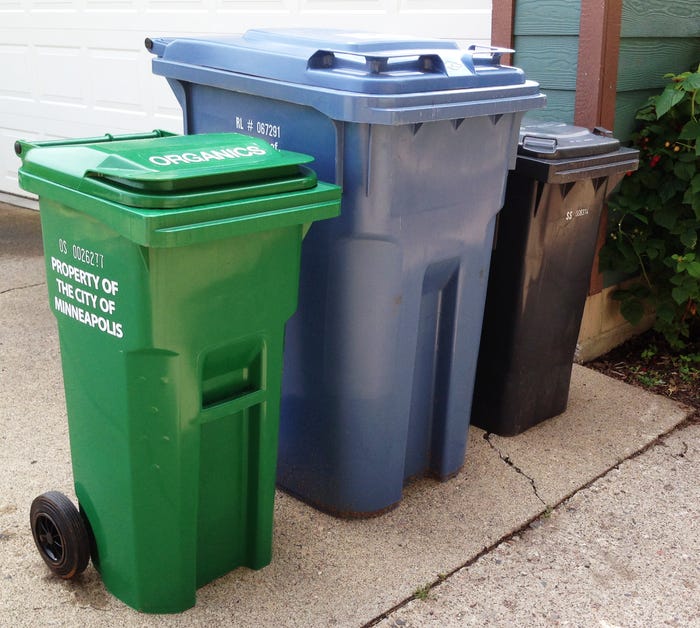Kish’s Early Passion for the Environment Led Her to a Career in Recycling
The Waste360 40 Under 40 award recipient spoke with us about how she found her place in the waste and recycling industry and some of her career accomplishments.

Kellie Kish, recycling coordinator for the City of Minneapolis, developed a passion for the environment at a young age, which eventually led her to a career in the waste and recycling industry.
Throughout her career, she has helped create and implement a variety of programs and initiatives, including Minnesota’s first co-collected, source-separated organics composting collection program, the Minnesota Composting Council and the Green-To-Go packaging ordinance. She is also a Solid Waste Association of North America Young Professional and an active participant in local events and programs.
“The statement ‘if you love your job, it isn't work’ describes Kish’s work ethic perfectly. She started her career in the waste industry while still in college and has accomplished a lot in her short time. She contributes not only to her employers but to the entire waste community in the Twin Cities Metro Region and beyond. She is never off the clock as her passion for education will turn a simple yes or no question into a 15-minute conversation," says Marcus Zbinden, Kish’s former supervisor and fellow Minnesota Composting Council board member. “Her willingness to push the envelope by encouraging new and innovative programs and techniques is necessary during this complex time in waste management, where high recycling and composting goals, principles of sustainable materials management and the circular economy are coming to the forefront.”
The Waste360 40 Under 40 award recipient recently spoke with us about how she found her place in the waste and recycling industry, some of her career accomplishments and what the City of Minneapolis is focusing on for 2017 and beyond.
Waste360: How did you begin your career in the waste and recycling industry?
Kellie Kish: My interest in the environment began at a young age. Recently, my parents found a video from my fourth grade concert where I sang a song about recycling and a video where I refused to rip the gift wrap on a gift I was opening. While watching those videos, I think it’s pretty clear that I was destined to have some sort of environmental career.
When I was in college, I wasn’t 100 percent sure what I wanted to do so I attended a job and internship fair to see what types of positions were out there. I had no intention of applying for a job while I was there, but I did end up applying for an internship at Carver County Environmental Services in Minnesota and getting the position. I can honestly say that internship was one of the best experiences of my life. I got to do everything from research at a demonstration organics composting site to resident education to collecting, sorting and disposing of hazardous waste at a recycling facility. I actually had the county extend my internship so that I could participate in the internship for the University of Minnesota’s Higher Education Consortium for Urban Affairs class, where a good portion of your schoolwork is working at an internship location. The internship really helped me understand all of the different things that someone could do with a career in the waste and recycling industry.
From there, I went to work for Anoka County Integrated Waste Management as a recycling intern for about a year and a half, and then I worked for the Recycling Association of Minnesota as a program manager, where I helped expand a program called Message in a Bottle. With that program, large bottle-shaped recycling containers are placed at gas stations, cash wash facilities and other facilities to collect recyclables, which are collected and sorted via individuals with developmental disabilities from local vocational centers. That program is a great way for those who are chronically unemployed to get good, green jobs. I also helped with the Recycle Your Holidays program, a statewide holiday light recycling program.
After that, my former manager at Carver County reached out to me and offered me a grant manager role at the demonstration organics composting site, where I spent my days digging in piles, doing sorts, pulling water samples and submitting them to the lab for testing and a variety of other things.
I stayed in that role for a while until a position came open at the City of Minneapolis, where I reside. I had dealt with a 40-minute or more commute my entire professional career, and when an opportunity came up to bike or take the bus to work, I had to jump on it.
Waste360: You were a key team member on the Source Separated Organics research program team that established the state’s first co-collected, source-separated organics composting collection program. Tell us a little bit about that experience.
Kellie Kish: When I was an intern at Carver County, it had one composting site open. When I came back as the grant manager, that site had closed and was being moved to a new location. We heavily promoted the new co-collected, source-separated organics composting collection program with incentives to try and get more residents to participate. For example, we mailed out surveys to get a better understanding of residents’ attitudes and beliefs about organics recycling so that we could develop educational materials to address the barriers that residents had. Residents who turned in their surveys got a free collection pail, a starter set of bags, a magnet, educational materials about what materials can and cannot be placed in the pail and information about what happens with the organics when they arrive at the composting site. We also used this methodology when we rolled out the organics program in Minneapolis because it was so effective.

At that time, Minnesota only had two classifications of composting sites: yard waste and municipal solid waste (MSW). Our purpose of the composting demonstration projects was to show that by adding organics to yard waste, composting facilities could have lower design requirements than MSW composting sites because there would be a minimal environmental impact. We tracked temperatures and water collection after rain events and analyzed the data to show the minimal impact difference of yard waste plus organics compared to MSW. This data was provided to the state so that it could be used to develop site and design rules for a new category of composting facilities.
The state recently passed changes to the rules and added a new tier to the classifications of composting sites: source-separated materials. A couple of the current MSW composters are switching over to the new permit type, but there aren’t any new sites in the works yet.
Over the past couple of years, the county has received five grants to continue its composting work. When I was with the county, we were using ceramic suction tubes to collect water under the piles, but since the composting process absorbs water, the state felt that we didn’t have enough liquid to run all of the samples that we collected. With the grant the county has now, it’s going to install ground water monitoring wells to try and get more water.
Waste360: How did you help establish the Minnesota Composting Council and become its founding member?
Kellie Kish: While I was doing research at the demonstration composting facility and the state was looking at reviewing and updating its composting rules, it became pretty clear to me that Minnesota needed an organization that could speak on behalf of the composters and compost users.
To get the ball rolling, I brought together a group of people who work in the composting world and asked them if they thought it would be a good idea for us to start a state chapter of the U.S. Composting Council (USCC). We crafted some ideas and moved forward with a plan.
After about a year, we completed our incorporation work, voted for our initial board and got the bylaws together. The board itself started out with nine people and has since grown to 11. The council is comprised of 31 member organizations that equate to more than 50 individual members. Our main focus hasn’t been on solicitation of memberships, but that is something we are ramping up for 2017.
Some of our accomplishments so far include comments on changes to the State of Minnesota Compost Siting and Design Rules; releasing a report in 2014 on the Economic Value of the Composting Industry in Minnesota; comments to the state’s Metropolitan Solid Waste Policy Plan; providing assistance to the state’s noxious weed council and various state agencies during the Avian Flu outbreak in 2015; teaming with the Association of Recycling Managers to lead the development of an Organics Outreach and Style Guide that created consistent terms for use in educational information; partnering with ARM to develop a model backyard and small site composting ordinance document to assist local units of government in determining pros and cons of various ordinance options; assisting the state (MPCA and MnDOT) in updating Compost Specs for MnDOT applications to include compost created from source-separated organics; developing a unique fundraising opportunity that closes the loop on organics recycling called Plate to Garden Compost; and holding various educational workshops and tours.
Our main priority for 2017 is to promote compost use by local units of government by informing them of changes to MnDOT specs, encouraging them to update their specs to match MnDOT if necessary and encouraging the return of organic soil content in construction of residential and commercial buildings. We’ll be asking our membership if they think there is interest in the MNCC developing model ordinance language for either of these or other types of compost use as well.
We’ve also received a grant from the MPCA to develop three additional compost operator trainings. The MPCA created the grant as the new source-separated organic material (SSOM) composting facility permit type. The MPCA realized a need to provide some resources to have training courses made for these annual training requirements as they do not have the staff time or expertise to develop and hold them annually.
Lastly, we are preparing to celebrate our five-year anniversary next January, which is very exciting for us.
Waste360: Can you explain how you helped create an effective recycling educational plan that resulted in a 40 percent opt-in participation rate within 13 months of the program’s start?
Kellie Kish: Here in Minnesota, we are quite lucky that everything that is considered garbage has tax on it, both at the state level and at the county level. All of that money gets pooled together and distributed to the counties based on their population to help cover costs associated with recycling and organics programs, education, etc.
In 2015, the state conducted a waste characterization study and found that between 30 and 40 percent of what Minnesota residents were throwing away could be composted. In response to that finding, the state increased its recycling goals at the state level for the metro area to 75 percent by 2030, and the state legislator passed along additional funds for organics programs in an attempt to get more cities to develop organics programs. Hennepin County, where Minneapolis is located, divided up its share of organics program funds based on the number of households cities had signed up for organics.
Minneapolis received $315,000 in 2016 to promote the program and to begin our education efforts. We sent out press releases and direct mailings, posted social media posts and attended various community events. The first mailing that we sent out had a postage-paid reply card attached to it so all residents had to do was fill out their information and mail the card back to us to sign up.
One of the main focuses for our educational plan was to break down the language barriers. Minneapolis has a lot of first-generation immigrants who speak various languages so we felt it was important to reach out to those communities to get them involved. We worked with the city’s neighborhood and community relations department and Hennepin County to create a variety of different pre-transcribed materials and signage in different languages, sent interns door to door to encourage signups and sponsored neighborhood and community events. We are very lucky that Hennepin County provides graphic design resources for all of its cities so we didn’t have to cover the costs for the design for our ad campaign, our photo shoots or our printing.

We are also very fortunate that city staff and our contractors, comprised of small haulers, do collections of materials so that we can access collections information at any time to find and resolve issues that may pop up. If the employees doing the routes come across contaminated bins, for example, they leave the bin at the curb with an educational tag that includes information on why they didn’t take the material and how the resident can resolve the issue. In addition to the educational tag, we will send the resident additional information via mail. We also use cart hangers, which are very helpful and more affordable than direct mailings. Our next one is going out in a few weeks and will focus on plastic-lined paper products.
To help improve recycling efforts across the board, we conduct frequent waste sorts with our composter SET, which recently told us that it doesn’t worry about any loads coming from residential Minneapolis because it’s cleaner than anything it’s receiving from commercial sources.
For our educational efforts this year, we are going to utilize interns again to do door-to-door signups, but we are going to pair interns together to hopefully cover more languages. We are also going to participate in more community events to reach a broader range of residents.
Waste360: Tell us about the Green To Go packaging ordinance you helped develop and implement.
Kellie Kish: It’s the health department of Minneapolis’ food service packaging ordinance, and it’s being implemented in stages. As an expert in waste and recycling, I helped the health department decide what should be exempt.
As of Earth Day 2016, food service establishments aren’t allowed to use expanded polystyrene Styrofoam anymore; all materials must be reusable, recyclable or compostable. Compostable items must be BPI certified or meet ASTM standards D6400 or D6868, and preferred plastics include numbers 1, 2 and 5.
On Earth Day this year, all plastic-lined paper products were supposed to be certified compostable. but that has now been extended to 2018 to give food service establishments more time to swap out the materials they are currently using.
I continue to meet with the health department to do more outreach and education to help them evaluate products that should be given exemptions.
Waste360: What goals is the City of Minneapolis currently working toward?
Kellie Kish: We want to continue to do outreach for the organics program to ramp that up and get more participation rates. A lot of households have already made the switch from large garbage bins to small ones since adding organics collection, but a lot of households still have two to four garbage bins.

In addition to that, we are wrapping up the final stages of our commercial waste study, which looks at strategies to increase recycling and composting in commercial, industrial and multifamily sectors. Currently, we only work on the residential solid waste and recycling side, but there may be some big changes coming down the pipeline that go hand-in-hand with the city’s zero waste plan.
We are also focusing on bringing attention back to regular recycling because we steered away from that a little bit when we launched the organics program. We rolled out single-stream recycling in 2013, and in early 2015, we began promoting the organics program so we had very little time to educate residents on what can and cannot go into regular recycling bins. To help us get back on track, we are conducting recycling sorts to find out where residents are confused so that we can educate them and overcome any issues.
Looking into 2018 and beyond, we are starting to develop diversion plans for the Summer X Games, the Super Bowl and the NCAA Final Four. I’m hoping we will look into modifying our billing structure to incentivize people to recycle more, participate in the organics program and reduce their amount of trash generated in the next several years as well
Waste360: What advice would you give to those who are interested in having a career in the waste and recycling industry?
Kellie Kish: Don’t be afraid to ask questions or propose new ideas. Keep up to date on what’s happening in the industry by frequently reading and going on tours. Also, take advantage of every opportunity to meet new people and make good connections. I wouldn’t be where I am today without having an avid interest in meeting new people, learning about and taking interest in their work and answering questions and helping out whenever I can.
When it comes to waste sorts, you can’t get others to help out unless they know that you have helped them in the past or are willing to help them in the future.
Lastly, particularly if working for a public agency, don’t get discouraged that things may take some time for progress to occur. Use that time to continue to evaluate your plan and make sure that the educational messages and methods used are appropriate for the audience.
About the Author
You May Also Like




